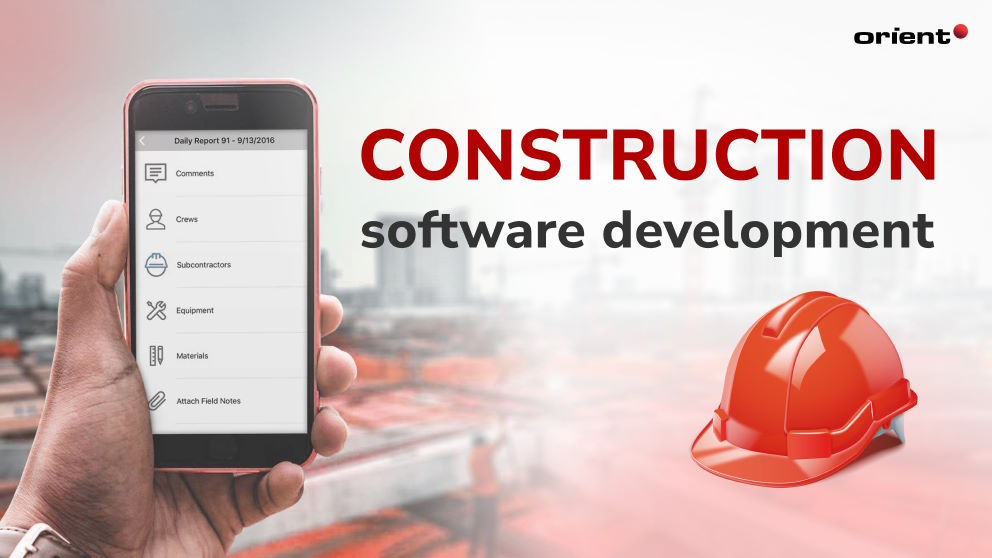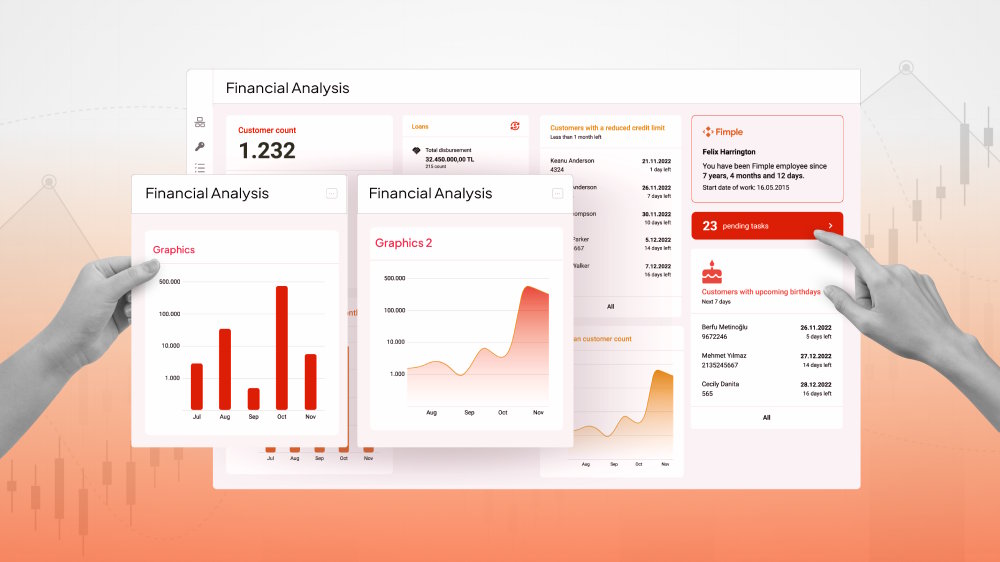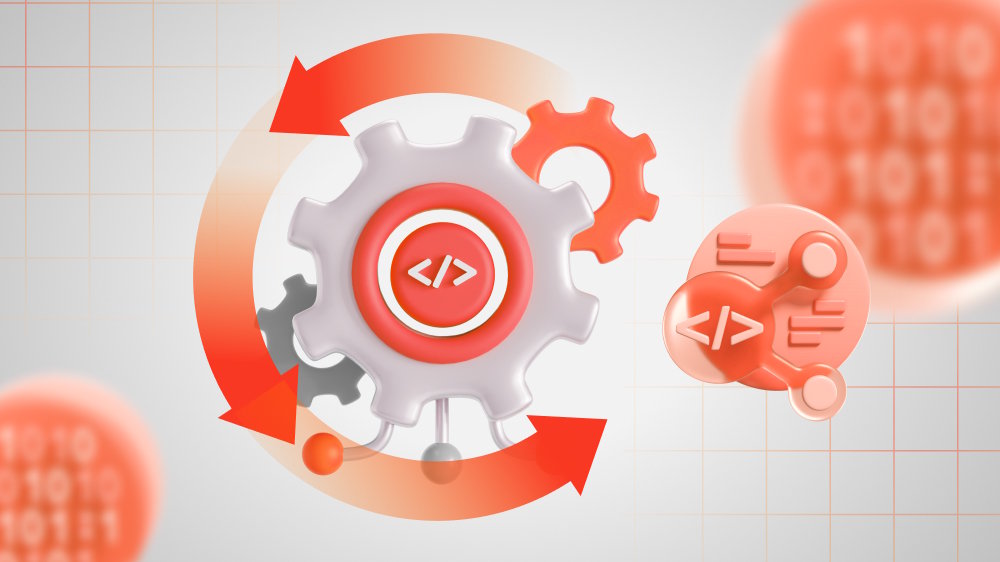
Construction Software Development: A Comprehensive Overview

Content Map
More chaptersCan you imagine our world without the use of any kind of technology? In light of the heightened relevance of technology following the pandemic, it nearly seems unthinkable. Can you imagine how the pandemic would have been without technology?
It is certain that before the pandemic, many industries used technology to minimize error-prone and tedious manual work. Healthcare, marketing, supply chain management, finance, banking, and the list goes on are a few noteworthy examples. However, there is one sector that is lagging behind in the digital transformation era - construction. It is notoriously known to use spreadsheets to manage most of its workload. It is gradually catching up, however, and there might be serious disruptions in the industry.
This article aims to examine the obstacles and benefits of construction software development, the reasons construction tech is booming, and why outsourcing construction software development is an excellent solution.
What Is Construction Software?
Construction management software (commonly referred to as construction software) is a broad term used in the architecture and construction industry to refer to any computer-facilitated system that supports any stage of a construction project. Construction management software can be used for a variety of purposes, including planning, document preservation and administration, quality control, building and system design, project management, bookkeeping, and more.
Companies that provide custom construction software often aim to facilitate the organization of crucial project elements, including project management, monitoring, accounting, and others.
Challenges in Construction Software Development - Why Are Construction Companies Resisting Digital Transformation?
Due to the slow progression in construction tech, companies appear to be pushing digital transformation away. That isn’t necessarily the case, though. The adoption of technology in construction can be tricky and complicated. Some of the challenges tech enthusiasts in construction face include:
Project Fragmentation
Fragmentation refers to a supply chain that has been divided up into several sections. In a broad sense, when businesses are fragmented, they distribute the production process across several producers and suppliers. Because of this, businesses develop their products and services via independent vendors and component manufacturers.
This is the case for construction projects. Its value chain is often broken down into numerous segments. With numerous companies working on a single project, communication can be a serious challenge. When a digital solution is adopted and comes into the picture, this challenge has added a layer of complication: Users from different companies log their changes in a system and generate multiple reports. Then, the project manager needs to manage and go through the paperwork and changes made to the system. All these steps seem especially inefficient in short-term projects.
The many layers of complication and communication may result in a decrease in the overall productivity and quality of the project.
Low Margins
Construction is notoriously known as a low-margin industry. The low margins and rising cost of material and labor have already posed a challenge to the industry. Adding on the cost of technology adoption, many business owners deem this move risky. That’s not to mention other associated costs like talent acquisition and training costs.
Multiple Customer Personas
Construction business owners often claim that it is hard to pinpoint a clear customer persona. The buyer persona varies depending on the project - it can be the procurement manager, project manager, or even the IT manager. Most purchase decisions are made on a project level rather than an enterprise level.
Consequently, the process of selling new projects must be done all over again, lowering net retention and an increase in retention costs. Businesses would also be reluctant to transfer construction software from one project to another because of shifting partners.
Human Factor
Construction workers, who have relied on manual work their whole lives, often do not believe that construction software solutions make their jobs easier. This belief, coupled with the unfamiliarity with such technology, can make it difficult to persuade workers to learn the usage of software.
Benefits of Construction Software Development

Construction technology certainly faces many hurdles in its journey of digital transformation. Even then, a slight shift in mindset makes the entire process much easier. When you look beyond the existing fragmentation, low margins, high costs, diverse customer persona, and human factor and think of the long-term sustainability, costs saved, and enhanced productivity, the hardships will all be worth it. Let’s dive a little deeper into the benefits custom construction software development offers.
Easy Access to Critical Job Costs and Project Details
A survey by Software Connect has shown that the most frequently requested software functions are work costing, project tracking, and estimating.
Cloud-based, centralized, and analytics-driven construction management systems enable project managers to cross-reference current and historical construction data, allowing them to make more informed decisions about resource allocation or estimate costs. An efficient construction project management software also allows project managers to easily communicate crucial documents, track project specifics, and submit requests. The project status can be accessed instantly. Actions and recommendations are sent to the right people, allowing timely adjustments and adaptions to be made.
Better Collaboration and Communication
Communication is key. This holds true not just for the construction business but for all industries. However, the lack of proper communication skills and tools often leads to misunderstandings, which eventually slows down the entire process. What comes after is often a lot of back and forth in gathering the necessary information or dates to clear up any confusion.
The process of construction software development not only offers automation it also offers a centralized place for all the crucial data one needs when referring to the project.
Saves Time, Less Cost
Construction business processes are repetitive and tedious. Time and human resources spent on these tasks are massive. Even then, tasks done manually are often error-prone. Mistakes cost businesses more time and money to go back and forth correcting mistakes. Unwanted errors easily cause bottlenecks, which make the work stressful since construction deadlines are often tight.
With the help of the right team of construction software development, however, all those tasks are automized. As a result, companies spend less on human resources and fixing mistakes, and deadlines are met, while the staff are given space and time to focus on value-driven business activities.
Real-Time Insights
Once a construction project kickstarts, whether you are the project manager, client, or sponsor, you would want to stay within the loop when there is a status update or changes made. Unfortunately, that isn’t always the case, as traditionally, updates are only given periodically in status reports.
This may affect a project negatively as you would want to make important decisions as soon as possible to get the project back on the right track.
With immediate access to the project status, construction software makes it easy to stay updated on the project’s progress and pinpoint issues to mitigate risks.
Boost Productivity
With all the above-mentioned benefits combined, it is clear that construction software boosts productivity significantly. It takes away the overhead of the tedious construction processes and automates, centralizes, and presents them clearly in a dashboard.
The software provides businesses with a powerful tool to enjoy enhanced productivity and even innovate construction’s traditional way of conducting work.
Construction Tech Is Booming
McKinsey has reported that due to the high demand for infrastructure, the workforce constraint, and the mounting stakeholder pressure for data integration and transparency, construction tech has experienced an explosion in investment. Between 2020 and 2022, it is predicted that $50 billion was invested in architecture, engineering, and construction technology, an increase of 85% over the previous three years.
Numbers don’t lie. It is clear that the construction industry is not only more open but also eager to adopt custom software solutions and digitize. There are several reasons behind this shift in mindset.
- Investors are optimistic. McKinsey has pointed out the fact that a growing number of investors are beginning to understand that AEC technology has the potential to transform the way the construction industry operates and reshape value pools on a large scale. They also believe that investment in the construction industry will stay at great levels in 2023.
- Digital collaboration is essential. After the pandemic, construction companies have realized the value of digital collaboration. Smooth collaboration is the basis of a successful project. Gathering investments, communicating with the client, managing materials and equipment, and project monitoring are just a few processes that can benefit from digital solutions.
- Investment is being prompted by economic reasons and regulations. The boom of construction tech is a combination of supply and demand. International demand for construction software is strong and rising. Governments have even made moves to push the growth of the industry with certain investments. This, with the shortage of skilled workers, has advanced the next chapter of the construction industry.
Why Outsource Construction Software Development?

In the light of this knowledge, it is worth noting that the construction sector is rather young. Building solutions from the ground up can be a serious challenge that costs you a lot of time and money. Therefore, it is best to consult a construction software development company.
Not only do you save a lot of time and hard work hiring, building, and maintaining a team of developers, but businesses like Orient Software offer excellent, dedicated software teams. Instead of searching, you have access to a large talent pool of professionals. Spend your time and energy focusing on your business requests in a construction solution. Then, let your chosen partner do the hard work: Streamlining crucial project elements such as project management, monitoring, accounting, and others.
All in all, understanding where the construction sector is now is just as important as choosing the right software development company to help you stay ahead of the curve and maintain the company’s core values at the same time.






